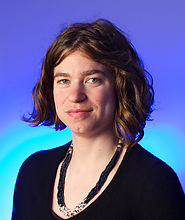 Shelby Kimmel, a Hartree Postdoctoral Fellow in the Joint Center for Quantum Information and Computer Science (QuICS), studies what problems quantum computers could solve and how to understand when these devices are functioning properly.
Shelby Kimmel, a Hartree Postdoctoral Fellow in the Joint Center for Quantum Information and Computer Science (QuICS), studies what problems quantum computers could solve and how to understand when these devices are functioning properly.
Using quantum algorithms, Kimmel aims to show how quantum computers can theoretically solve certain problems faster than classical versions can. Kimmel, who earned her doctorate in physics at the Massachusetts Institute of Technology, says she often studies the relative power of quantum and classical computers when both are given access to an unknown function, or a “black box.”
Kimmel aims to find cases in which a quantum computer can learn information about an unknown function faster than a classical computer. Many real-world problems can be recast in this black box model, so quicker solutions can translate to fast quantum algorithms.
“One of my interests is in designing quantum algorithms,” she says, “and trying to understand, once we build a quantum computer, what are we going to be able to do with it? What are we not going to be able to do with it?”
Another aspect of her research involves process tomography, a method for characterizing gates performed in quantum computers. With this technique, researchers understand the nature of errors in a quantum processor, and Kimmel works to find better methods to carry out process tomography.
Current tomographic protocols are robust against errors, but are not efficient, Kimmel says, while another tool known as compressed sensing allows for efficient data collection when the signal has a certain structure. Kimmel hopes to combine the two to find an approach that is both highly accurate and efficient.
Kimmel came to QuICS last August as a Hartree Fellow. This award for distinguished researchers honors Douglas Hartree, a scientist at the National Institute of Standards and Technology (NIST) who made contributions to physics and computer science. Previously, Kimmel was a finalist for the Leroy Apker Award as an undergraduate studying astrophysics at Williams College.
Yi-Kai Liu, a QuICS Fellow and a staff scientist at NIST, says Kimmel’s range of work exemplifies the overall goals of the center.
"Shelby is working on a variety of topics, ranging from fundamental problems in quantum complexity theory, to developing practical methods for controlling the qubits that experimentalists are building today,” he says. “I think that is what QuICS is all about—understanding the power of quantum computers, and using our experience with classical computers to build quantum ones."
QuICS is one of 16 labs and centers in the University of Maryland Institute for Advanced Computer Studies.
—Story by Joe Zimmermann